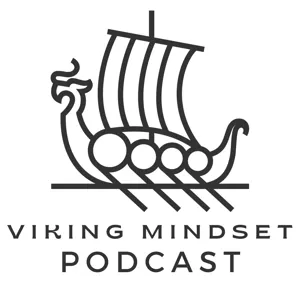Podcast Summary
Understanding the Power of Envy: Envy can motivate us to improve or lead to destructive consequences, requiring self-awareness and balance
Envy, an often overlooked and misunderstood emotion, serves as a powerful tool for social comparison and can drive us to improve ourselves or lead us to destructive consequences. As illustrated in the story of Jessica Kyle and her experience with dengue fever, envy can be physically and emotionally painful, but it can also serve as a wake-up call to our relative position in life and motivate us to make positive changes. However, envy can also lead to negative outcomes, such as resentment, rage, and even revenge. Homer Simpson, a classic example of envy, demonstrates the complex nature of this emotion and its potential impact on our lives. Ultimately, envy is a part of the human experience, and understanding its role can help us navigate the complexities of social comparisons and relationships.
Envy reveals our awareness of social hierarchies: Envy, though unpleasant, motivates us to strive for improvement and progress by highlighting social inequalities and our desire for recognition
Envy, an emotion often associated with negative feelings, can reveal important aspects of ourselves. In "The Simpsons" episode featuring Ned Flanders, Homer's envy towards Flanders' success leads him to underestimate Flanders' determination and entrepreneurial spirit. However, envy serves a purpose, as it stems from the awareness of social hierarchies and inequalities, as anthropologist Christopher Boehm explains. This awareness is deeply rooted in human nature, even among primates, and can drive us to strive for improvement and progress. Therefore, while envy may not feel good, it can be a powerful motivator and a reflection of our innate desire for social recognition.
Comparing Ourselves to Others: The Power and Peril: Social comparisons can inspire improvement but also lead to envy and unhappiness. Be aware of the impact on mental well-being and strive for balance.
Humans make sense of the world through social comparisons. We constantly compare ourselves to others, not just in terms of physical attributes, but also in skills, achievements, and possessions. This comparison helps us understand our place in the hierarchy and can inspire us to work harder and strive for improvement. However, envy can also lead to unhappiness, and the prevalence of social media has increased the frequency and intensity of these comparisons. A study by researcher Ohad Barzile found that using social media can put us in a constant mode of comparison, leading to feelings of inadequacy and dissatisfaction with our own lives. However, not all envy is negative. Benign envy can inspire us to admire and learn from others, pushing us to reach our goals. Ultimately, it's important to be aware of the impact of social comparisons on our mental well-being and strive for a healthy balance.
Fear of missing out (FOMO) and its impact on happiness: Excessive social comparison fueled by social media can lead to unhappiness, anxiety, and regret due to the fear of missing out on potential group experiences, shaping friendships and social dynamics.
Excessive social comparison, fueled by social media, can decrease happiness and lead to feelings of anxiety and fear of missing out (FOMO). This anxiety isn't about the experience itself, but rather the fear of missing out on group experiences that could shape the dynamics of friendships and social groups in the future. This fear can lead individuals to make decisions based on group belongingness rather than their own preferences, causing potential regret and dissatisfaction. Even though it may seem appealing to be part of the "exotic event," the fear of missing out on potential group experiences can be more compelling. However, it's important to remember that these feelings are not necessarily indicative of personal shortcomings or envy, but rather a natural response to social comparison and the desire for social connection.
Comparing ourselves to peers can lead to malicious envy: Recognizing and managing envy towards peers can help prevent negative emotions and Schadenfreude
Envy often arises when we compare ourselves to those in similar situations, and it can lead to negative emotions and even pleasure in others' misfortunes, a phenomenon known as Schadenfreude. Sociologists call this type of envy "malicious envy," and it's most potent when we compare ourselves to our peers. This form of envy can be hard to confront and can lead to feelings of pleasure when the objects of our envy experience setbacks. A classic example of this dynamic can be seen in the movie "Amadeus," where the character Salieri envies Mozart's talent and takes pleasure in his downfall. Understanding this dynamic can help us recognize and manage our own envy and its potential negative consequences.
The pleasure derived from another's downfall due to hypocrisy or perceived injustice: Schadenfreude can be triggered by hypocrisy and perceived injustice, leading to pleasure and satisfaction when those with more than they deserve fall from grace
The feeling of Schadenfreude, or pleasure derived from another's misfortune, can be triggered by various factors, including hypocrisy and the downfall of those perceived as having more than they deserve. The discussion on the film "Amadeus" highlighted how Salieri, despite his talent and appreciation for Mozart, was consumed by envy and ultimately became the architect of his downfall, leading to a sense of pleasure and justice for some. The case of Jimmy Swaggart, a popular televangelist who fell from grace due to moral compromise, served as a real-life example of Schadenfreude. Swaggart's hypocrisy and the perceived injustice of his wealth and power contrasted with his personal actions, leading to a sense of pleasure and satisfaction for many when he was brought down. This emotion is not limited to hypocrites, but can also be directed towards those who are perceived as having too much power, wealth, or success.
Envy and the fear of appearing envious: While it's unnatural to feel genuinely happy for others' success, hiding negative emotions like envy can prevent us from expressing joy and potentially damaging relationships.
Human nature often includes feelings of envy and a tendency to bring down those who seem to be doing better than us. Martha Stewart, as an example of success, drew criticism and even resentment from some people due to her confidence and achievements. These negative emotions towards successful individuals, such as envy and schadenfreude, are difficult to study as they are often hidden. Primatologist Christopher Beaumont's research on hunter-gatherer tribes shows that groups can ostracize or even kill those who become too successful. While it's unnatural for us to feel genuinely happy for others' success, it's wise to hide our negative emotions, including envy, as expressing them can reveal our perceived inferiority. In essence, the fear of appearing envious can prevent us from expressing joy for others' accomplishments.
Pleasure from rival's misfortune in sports: Fans experience increased pleasure when their sports rival suffers, driven by the rivalry itself, shown through brain activity and facial expressions.
Schadenfreude, the feeling of pleasure derived from another's misfortune, is a powerful emotion that can be particularly strong in the context of sports rivalries. Researchers have found that fans who are highly identified with their team experience increased pleasure when their rival team or player suffers an injury or loss, even if it doesn't benefit their own team in any material way. This pleasure is thought to be driven solely by the rivalry itself. Studies using functional MRI machines and facial electromyography have provided evidence for this phenomenon, suggesting that there is a positive affect being felt when witnessing a rival's misfortune. These findings highlight the complex emotions that can arise in the context of sports rivalries and the importance of understanding the motivations behind these feelings.
Our brain responds with pleasure to rivals' misfortune: Envy towards high-status groups can lead to malicious actions, fueled by neurological responses and socio-economic factors.
Our brain responds with pleasure when we see members of high-status groups, such as wealthy individuals or business people, experience misfortune. This response is linked to a desire to harm the rival group and may even predict aggressive behaviors. Envy towards such groups can lead to malicious envy, which in extreme cases, can trigger harmful actions against the envied group. This research suggests that our primal neurological responses, which may have helped ancient tribes form strong identities, can have negative consequences in modern society. The study also highlights the potential role of socio-economic factors in fueling malicious envy and the dangerous consequences it can have.
Envy and the desire to avoid last place: Envy can lead individuals to support harmful policies or actions to maintain hierarchy and avoid feeling last in group dynamics, causing harm to self and others.
Envy and the desire to avoid being in the last place can drive harmful behaviors, especially when it comes to group dynamics. This psychological impulse can lead individuals to support policies or actions that may be detrimental to themselves, but maintain a sense of hierarchy and keep them from feeling like they're at the bottom. This phenomenon can be seen in various contexts, such as historical events involving persecution of certain groups, or in modern examples like reality TV shows. Envy can also lead to destructive group behaviors, causing harm to others and creating divisions. Understanding this psychological impulse can help us recognize and challenge it when it arises.
Exploring the Harmful Effects of Envy and Schadenfreude: Acknowledging and admitting to the presence of envy and schadenfreude can help prevent harmful actions and negative consequences.
Envy and Schadenfreude, the feeling of pleasure derived from others' misfortunes, can contribute to harmful actions and negative consequences, even leading to unspeakable acts. This was explored in the context of politics, where partisanship can fuel these emotions and lead to joy in others' misfortunes if it benefits one's own party. The research in this field is still new, but it raises important questions about the potential for these emotions to lead individuals down a destructive path. The first step to combating these emotions is acknowledging and admitting to their presence. Jessica's story, where she overcame her intense envy by acknowledging it, serves as an example of the power of acknowledgement. This episode was produced by Jenny Schmidt, Parth Shah, and edited by Tara Boyle, with contributions from Raina Cohen, Laura Quirrell, Thomas Liu, and Adam Zissman.
The power of tenacity and flexibility: Tenacious and flexible individuals, like Adam, inspire growth and progress in any endeavor.
The importance of tenacity and flexibility in achieving success. Shankar Vedantam, the host of Hidden Brain, has had the pleasure of working closely with Adam, who has consistently displayed these qualities throughout their collaborations. Their conversations have left Shankar impressed, and he encourages listeners to share the podcast with others to expand its reach. If you've enjoyed this episode, consider spreading the word about Hidden Brain to introduce new listeners to its insightful content. Ultimately, the resilience and adaptability of individuals like Adam serve as inspiring reminders of the potential for growth and progress in any endeavor.




